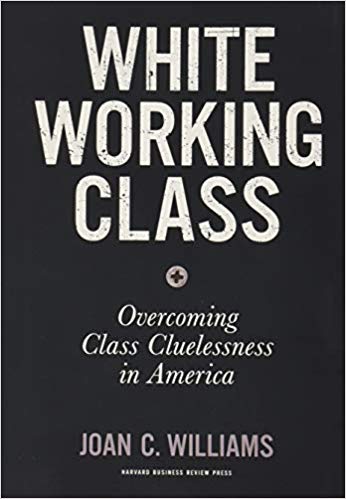“Born on third base; thinks he hit a triple.”
According to the current American political scene, divisiveness is not only a constant state of being but a banner for certain groups to march under. Joan C. Williams, the author of White Working Class - Overcoming Class Cluelessness in America from Harvard Press, a law professor at Hastings, San Francisco, expands on why a number of class systems in the US exist and are constantly exploited.
Warning, this is an uncomfortable though important book to read. The accusing finger may point in ways the reader, any reader, does not expect or enjoy. I encourage you to participate in the research survey Williams points to in this book, included below.
Williams argues that class abuses occurred even before slaves were brought to the US by caste systems from Europe and Asia. Conveniently and horribly, slavery gave the truly poor, uneducated new American whites a means to “step up the ladder” socially.
Slavery, aristocrats, the New Deal, and even the Affordable Care Act, according to Willams (a liberal) undermined any attempt at a Race Coalition promoted by many people, prominently Martin Luther King, Jr.
Now however, “class consciousness has been replaced by class cluelessness even class callousness.” Americans with privilege refer to the working class as the “poor” and lampoon and insult them, while holding a reverence for the truly poverty stricken. Liberals, Williams says, maim and cut with many well-intentioned but blind-to-reality programs. Guess how this turned politics around in the last 70 years?
Privileged? If you make over $100,000 per year even with only a high school diploma you are privileged. If you have two PhDs and wait tables, you are privileged. If you can afford a vacation, you are privileged. If you are retired and meet or exceed your housing and food costs, you are privileged. The badge of working class is not writ in stone.
I am, according to Williams, a class migrant. I was born into a working-class family, definitely blue collar, but quickly assessed the community situation around me. My parents, and I from the age of 13, worked hard. Others seemed to work less and yet have more free time, money, and a better quality of life. This was an intriguing situation for a child growing up in 1960-70’s industrial Chicago.
The first in my immediate family to get a university degree, a cousin and I were not allowed to talk about college as “we were no better than anyone else.” True to Williams’ data, we were largely shunned as our larger family thought we were “showing off.” My brother, the younger child, believes I ruined his life with my ambitions, by constant comparison in school and beyond. I simply wanted a better life. True again, Williams, I was the first to travel abroad, and like a traitor, left my community to move from Chicago to New York.
Williams’ solutions include acknowledging the hard work of the real working class. The plumber, the retail clerk, and the house cleaner are people with families doing work for everyone else, in order to “just make it” in an expensive world. This group covers all their expenses but receive slightly over the limit to qualify for many programs. Many working-class people do not apply for programs, or do so reluctantly due to humiliation. The section on the Affordable Care Act will make you rethink much of what you thought you knew about social programs.
The bottom line is: everyone deserves dignity in life. The lesson is: walk the talk.
Take the tests: https://implicit.harvard.edu/implicit
White Working Class - Overcoming Class Cluelessness in America
Joan C. Williams Harvard Business Review press 2017
